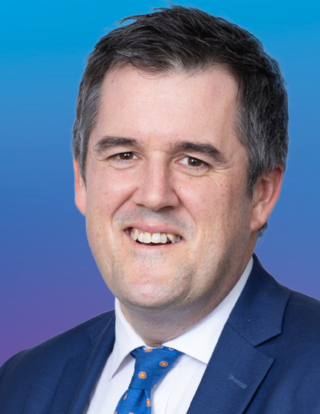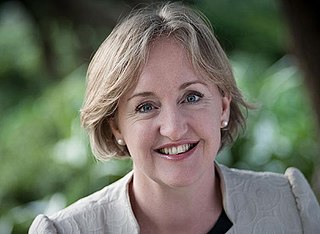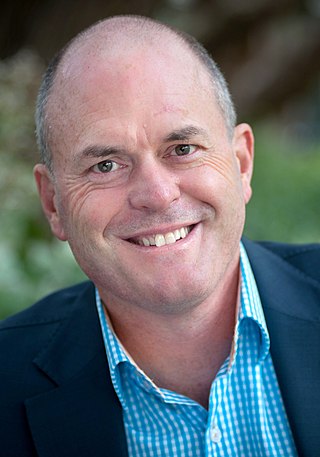The New Zealand National Party, shortened to National or the Nats, is a centre-right New Zealand political party that is the current senior ruling party. It is one of two major parties that dominate contemporary New Zealand politics, alongside its traditional rival, the Labour Party.

Gerard Anthony Brownlee is a New Zealand politician and the 32nd speaker of the New Zealand House of Representatives. He was first elected as a member of the New Zealand House of Representatives for Ilam in 1996, representing the National Party. He became a list MP in 2020.

Paula Lee Bennett is a New Zealand former politician who served as the 18th deputy prime minister of New Zealand between December 2016 and October 2017. She served as the deputy leader of the National Party from 2016 to 2020 and as MP for Upper Harbour from 2014 to 2020.

Nicola Laura Kaye was a New Zealand politician who served as Deputy Leader of the New Zealand National Party and Deputy Leader of the Opposition from 22 May 2020 to 14 July 2020.

Michael Allan Woodhouse is a New Zealand healthcare chief executive and former politician. He was a Member of Parliament for the National Party from 2008 to 2023.

Simon Joseph Bridges is a New Zealand retired politician, broadcaster and lawyer. He served as Leader of the National Party and Leader of the Opposition between 2018 and 2020, and as the Member of Parliament for Tauranga from the 2008 election to May 2022, when he resigned. Bridges is the first and currently the only Māori person to serve as leader of a major political party in New Zealand.

Amy Juliet Adams is a former New Zealand politician of the New Zealand National Party and the current chancellor of the University of Canterbury, Christchurch, New Zealand. She was the Member of Parliament for Selwyn from 2008 to 2020, when she retired.

Todd Michael Muller is a New Zealand former politician who served as the Leader of the New Zealand National Party and the Leader of the Opposition from 22 May to 14 July 2020.

Christopher Bishop is a New Zealand politician for the National Party. He was first elected to the New Zealand House of Representatives in 2014 as a list MP. Bishop won the Hutt South electorate in 2017 but lost the seat in 2020. He returned to Parliament as a National list MP and served as National spokesperson for Housing and Infrastructure and was the Shadow Leader of the House. He was the Chairperson of National's 2023 Election Campaign. He is the current MP for Hutt South. He is a former lobbyist for tobacco company Phillip Morris.
The 2016 New Zealand National Party leadership election was held on 12 December 2016 to determine the next Leader of the National Party and the 39th Prime Minister of New Zealand. A secret exhaustive ballot of the 59-member National parliamentary caucus was to be used in the event of a contested leadership.

The 52nd New Zealand Parliament was a meeting of the legislature in New Zealand, which opened on 7 November 2017 following the 2017 general election and dissolved on 6 September 2020. The New Zealand Parliament comprises the Sovereign and the House of Representatives, which consists of 120 members.

Nicola Valentine Willis is a New Zealand politician with a background in English literature and journalism. She is currently deputy leader of the National Party and in November 2023 was appointed minister of Finance in a coalition government with ACT and New Zealand First. Willis entered the New Zealand Parliament in 2018, when she inherited Steven Joyce's seat in Parliament as the next on the party list after his retirement from politics.

The 2018 New Zealand National Party leadership election was held on 27 February 2018 to determine the 12th Leader of the National Party. On 13 February 2018, Bill English announced his resignation as leader of the National Party, effective on 27 February 2018. He left Parliament on 13 March 2018. On 20 February, Deputy Leader Paula Bennett announced that a concurrent deputy leadership election would take place, in which she would stand.

The Shadow Cabinet of Simon Bridges was the official Opposition in the 52nd New Zealand Parliament between 11 March 2018 and 22 May 2020. It comprised all members of the New Zealand National Party, which was the largest party not a member of the Government.

An election for the parliamentary leadership of the New Zealand National Party took place in the National Party parliamentary caucus on 22 May 2020. Todd Muller and Nikki Kaye stood against the existing leader Simon Bridges and his deputy leader Paula Bennett following poor polling results. Muller and Kaye won the votes and became the new leader and deputy leader respectively.

The Shadow Cabinet of Todd Muller was the official Opposition of the 52nd New Zealand Parliament. It comprised the members of the New Zealand National Party, which was the largest party not a member of the Government.
There were three elections for the leadership of the New Zealand National Party in 2020:

The Shadow Cabinet of Judith Collins formed the official Opposition in the 53rd New Zealand Parliament, and previously in the 52nd Parliament. It comprised the members of the New Zealand National Party, which is the largest party not a member of the Government. On Collins' dismissal as leader on 25 November 2021, the cabinet essentially ceased to exist, but what remained was de jure led on an interim basis by her deputy leader, Shane Reti, until the next leadership election. The cabinet was succeeded by that of Christopher Luxon.

The 2021 New Zealand National Party leadership election was held on 30 November 2021 following the removal of leader Judith Collins in a vote of no confidence on 25 November 2021. Deputy leader Shane Reti was made interim leader until the election. Simon Bridges was the only person to publicly announce his candidacy. About an hour before the National Party caucus was set to meet, he withdrew from the race and endorsed Christopher Luxon.

The Shadow Cabinet of Christopher Luxon formed the official Opposition in the 53rd New Zealand Parliament from December 2021 to November 2023, replacing the Shadow Cabinet of Judith Collins. Christopher Luxon was appointed Leader of the National Party and Leader of the Opposition in a party leadership election on 30 November 2021.


















